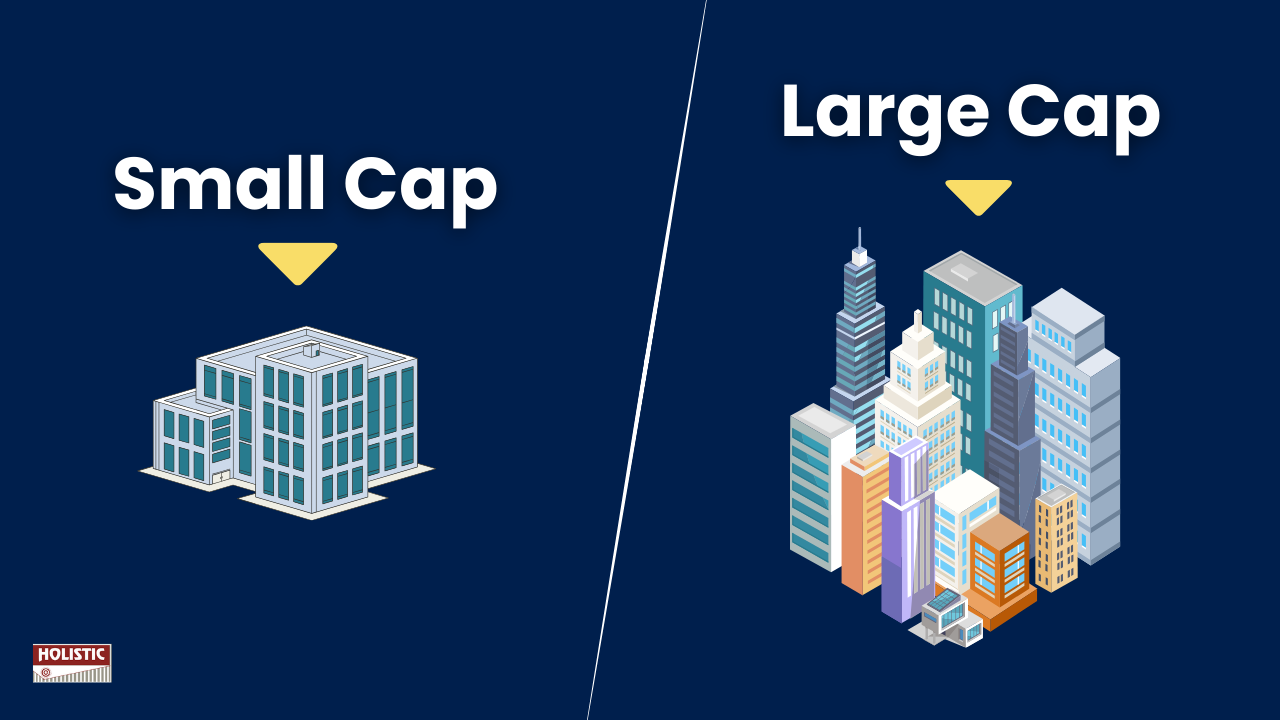Small-Cap vs. Large-Cap Funds: Which One Should You Invest In?

Investing in mutual funds can be overwhelming, especially when choosing between small-cap and large-cap funds. Both fund categories cater to different risk appetites, investment goals, and time horizons. In this blog, we will explore the key differences between small-cap and large-cap funds, their benefits, risks, and which one might be the right fit for your portfolio.
What Are Small-Cap and Large-Cap Funds?
Small-cap funds invest in companies ranked below the top 250 in terms of market capitalization. These are companies with a market cap of less than ₹5,000 crore in India. They are known for their high growth potential but also come with increased volatility and risk.
Large-cap funds invest in the top 100 companies by market capitalization. These companies have a market cap of over ₹20,000 crore and are well-established, financially stable, and less volatile compared to small-cap stocks.
Key Differences Between Small-Cap and Large-Cap Funds
| Factors | Small-Cap Funds | Large-Cap Funds |
| Risk Level | High | Low |
| Return Potential | High (can generate multi-bagger returns) | Moderate but stable |
| Volatility | High | Low |
| Time Horizon | Long-term (5+ years) | Medium to long-term (3+ years) |
| Liquidity | Lower | High |
| Market Conditions Sensitivity | Highly sensitive | Less affected by market fluctuations |
Pros and Cons of Small-Cap Funds
Advantages
- High Growth Potential: Small-cap stocks have the potential to deliver exponential returns over time.
- Early Investment Advantage: Investing in emerging companies early can yield high rewards.
- Diverse Investment Opportunities: Many small-cap companies belong to emerging sectors with growth potential.
Risks
- High Volatility: Prices can fluctuate significantly due to market conditions.
- Liquidity Issues: These stocks may not always have enough buyers, making it difficult to exit investments.
- Longer Holding Period Required: To benefit from their growth, investors need patience.
Pros and Cons of Large-Cap Funds
Advantages
- Stable Returns: Large-cap funds are less volatile and provide consistent returns over time.
- Lower Risk: These companies are well-established and can withstand market downturns.
- Liquidity: Large-cap stocks are highly liquid and easy to buy/sell.
Risks
- Lower Growth Potential: Compared to small caps, large-cap stocks have slower growth.
- Impact of Economic Slowdowns: Though stable, these stocks can be affected by economic downturns.
Who Should Invest in Small-Cap and Large-Cap Funds?
1. Small-Cap Funds Are Suitable For
- Investors with a high-risk appetite.
- Those looking for long-term wealth creation.
- Individuals willing to hold their investments for at least 5-10 years.
2. Large-Cap Funds Are Suitable For
- Conservative investors seeking stability and steady returns.
- Those with a moderate risk appetite.
- Investors who want to protect their capital while growing their wealth.
Performance Comparison: Small-Cap vs. Large-Cap Funds
Historically, small-cap funds have outperformed large-cap funds during bull markets, but they tend to suffer the most in bear markets. On the other hand, large-cap funds offer steady performance across market cycles, making them a safer bet for risk-averse investors.
Which One Should You Choose?
The choice between small-cap and large-cap funds depends on your financial goals, risk tolerance, and investment horizon. A balanced approach could be to diversify across both categories to mitigate risk while capturing growth opportunities.
Final Thoughts
Both small-cap and large-cap funds have their place in an investment portfolio. If you are an aggressive investor looking for high growth, small-cap funds may be the right choice. However, if stability and consistent returns are your priority, large-cap funds should be a part of your portfolio.
Before investing, assess your risk tolerance, financial goals, and market conditions to make an informed decision.



